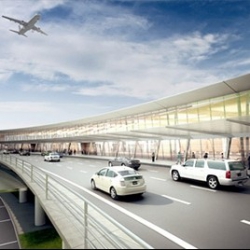
Bradley International Airport is the site being discussed for the proposed casino, which would have 2,000 slot machines and 150 table games.
MGM Resorts is angry about a proposed airport casino which might be built a mere 17 miles from the MGM Springfield in Springfield, Massachusetts. The idea of an airport casino was included in some documents released this week involving a joint gaming facility owned by the Mashantucket Pequot Tribe and the Mohegan Tribal Gaming Authority.
The airport in question would be located in Windsor Locks, Connecticut. The Connecticut Airport Authority (CAA) ahd the idea for a “first rate, substainable and profitable casino and entertainment facility” at the Windsor Locks airport.
Airport Casino for Tribal Gaming
The Mashantucket Pequot and the Mohegan Tribes, which own Foxwoods Casino and Mohegan Sun respectively, plan for the casino to attract 10,000 visitors daily. That would be in addition to the 17,000 passengers who arrive and depart at the casino each day.
MGM Springfield is a $950 million development which is set to open in 2018. Mohegan Sun and Foxwoods have been concerned about MGM Springfield taking customers away from them, because many gamblers from Western Massachusetts visit the two world-famous Connecticut casinos.
Alan Feldman Highly Critical
Alan Feldman, Executive VP of Global Government and Industry Affairs for MGM Resorts International, said the airport casino is self-defeating for all three gaming groups. Feldman said, “If you put a casino in the airport it’s gonna take away customers from Foxwoods, it’s gonna take away customers from Mohegan Sun, and it would take away customers from us.”
Mr. Feldman also discussed common talking points for MGM Resorts in their dispute with the Connecticut tribal gaming interests and the government of Connecticut: transparency and fairness. MGM Resorts filed a lawsuit against Connecticut, claiming they discriminated against gaming companies who wanted to build in Connecticut. MGM Resorts claims that no fair process was followed, but the favored groups were given a casino.
Lack of Transparency a Concern
Along those same lines, Alan Feldman complained that Connecticut’s leaders show a lack of transparency. The airport casino is a sign of a deal made in a smoky backroom.
Feldman said, “The point of this is the fact that all of this is being done in secret, behind closed doors, there is no public input. For anyone who’s in Hartford now you can see what happens when you allow public agencies to engage in these secretive backroom meetings what you end up with is a baseball stadium that’s incomplete and no one can use it, that’s not the way this should be done.”
MGM Resorts obtained hundreds of emails and documents using the Freedom of Information Act. The findings show a pattern of hidden dealings and deliberations.
Bradley International Airport
The casino would be placed in Bradley International Airport. The plan is an ambitious one. It calls for 2,000 slot machines and 150 table games. It is not know whether those 150 tables includes a poker room, but it is reasonable to assume it would, given the large number of tables being considered.
By way of comparison, Wynn Resorts is set to open a $4 billion casino on the Cotai Pensinsula in Macau. It was announced last week that the Wynn Palace would receive 150 table games–for a $4 billion property. While Macau’s gaming officials have been playing games with operators over the number of tables, it is remarkable that an airport casino would receive the same number of tables.
Chris Kervick’s Role in the Plans
When Windsor Locks First Selectman Chris Kervick was sworn in on November 25, 2015, the city passed a resolution stating that it would discuss with CAA, Sportstech, and other gaming interests about building a casino in the area.
When that pledge was made, it contained one major stipulation. Kervick said he would conduct public hearings about any casino negotiations, so everything would be transparent.
Chris Kervick’s Reaction to Criticism
When Fox 61 asked Chris Kervick about the pledge, he said the airport casino plan was just an idea which was being considered. Kervick said that people of Windsor Locks would be consulted when the time came to make decisions.
Kervick said, “Does it make sense from a public safety point of view? Does it make sense from a traffic and transportation point of view? And from a revenue point of view for the town of Windsor Locks?”
He added that the people of Windsor Locks would have the ultimate say in any approval. It is his job to pursue advantageous commercial situations for the city, but the people are the ultimate decider.
